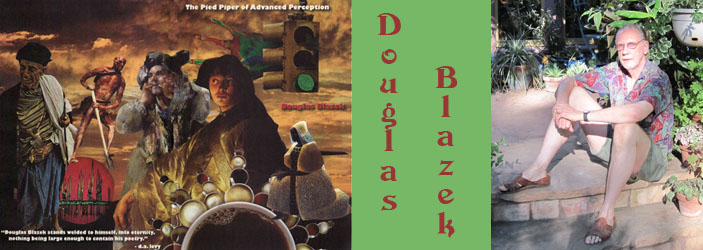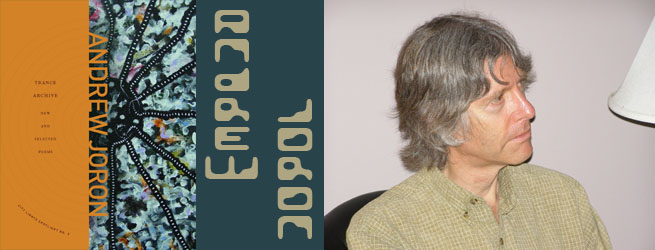Douglas Blazek and Andrew Joron
Monday, August 22 at 7:30 PM
Crossroads for the Arts at 1719 25th Street
Host: Tim Kahl
Douglas Blazek affected American letters during the 1960 as the publisher of the literary chapbook Ole and proprietor of the Open skull Press. Blazek was a major force in “underground”, i.e. non-mainstream press poetry. The author and editor of 35 books and magazines who has appeared in over 1300 periodicals since first being published in 1961, Blazek is recognized as one of the founders of the Mimeo Revolkution, a literary movement that sprang up concurrently with The Beats. He was instrumental in bringing non-establishment poets such as Charles Bukowski into the limelight, by publishing their work.
In 1984, Blazek publicly declared dissatisfaction with his accomplishment and vowed not to further seek book publication until he had acquired the powers that would, as he stated, “drive my work to ultimate ripeness.”
As described in the introduction to James DenBoer’s ‘A Bibliography of the Published Works of Douglas Blazek: 1961-2001’ (Glass Eye Books, 2003), Blazek then proceeded to enter a 25 year process of intense rewriting of virtually every previously published poem while continuing to write new poetry. Blazek is now emerging from his self-imposed exile (of a sort) to pursue in his new work and rewrites that which “has grown from mostly a literal biographical narrative to an elliptical suggestive discourse.”
In 2010, Glass Eye Books agreed to publish the first of the author’s 12 volumes of extensively rewritten life’s work: the first collection by Blazek in nearly 25 years. It will be available from Glass Eye Books and will be entitled After Walking To and Fro and Up and Down in It. Edition MUTA is going to publish the ensuing volumes Gutting Cats in Search of Fiddles and Aperture Mirror.
from News of a Useless Thing
IV.
The man is information after hydrogen.
His mind an expansive impasse
of complexity. Memory’s plenum
making datum’s density,
churning up enough undersea
to presage an end-kept course.
Tides in tension hasten
implications between out and in
safely dashing his indivisible run.
The ocean is as young as its occasion.
Pursuing legs assume what ages them.
Every wave is Wave merging
the meaning of wavering water.
Words vary to engage verse,
reversing to a useless thing.
Echoes backing out their beckoning
to resonate what creation
currently resumes again.
News convening One Event.
And this is it.
Andrew Joron is the author of Trance Archive: New and Selected Poems (City Lights, 2010). Joron’s earlier poetry collections include The Removes (Hard Press, 1999), Fathom (Black Square Editions, 2003), and The Sound Mirror (Flood Editions, 2008). The Cry at Zero, a selection of his prose poems and critical essays, was published by Counterpath Press in 2007. From the German, he has translated the Literary Essays of Marxist-Utopian philosopher Ernst Bloch (Stanford University Press, 1998) and most recently The Perpetual Motion Machine by the proto-Dada fantasist Paul Scheerbart (Wakefield Press, 2011). Joron lives in Berkeley, California, where he theorizes using the theremin.
A = A
Mine to ask a mask to say, A is not A.
No one, ever the contrarian, to answer.
The moon is both divided & multiplied
by water: as chance, as the plural of chant.
O diver, to be sea-surrounded by a thought bled white––
a blankness as likely as blackness.
What is the word for getting words & forgetting?
Might night right sight?
I, too late to relate
I & I, trap light in sound
& sing no thing that breath can bring.






